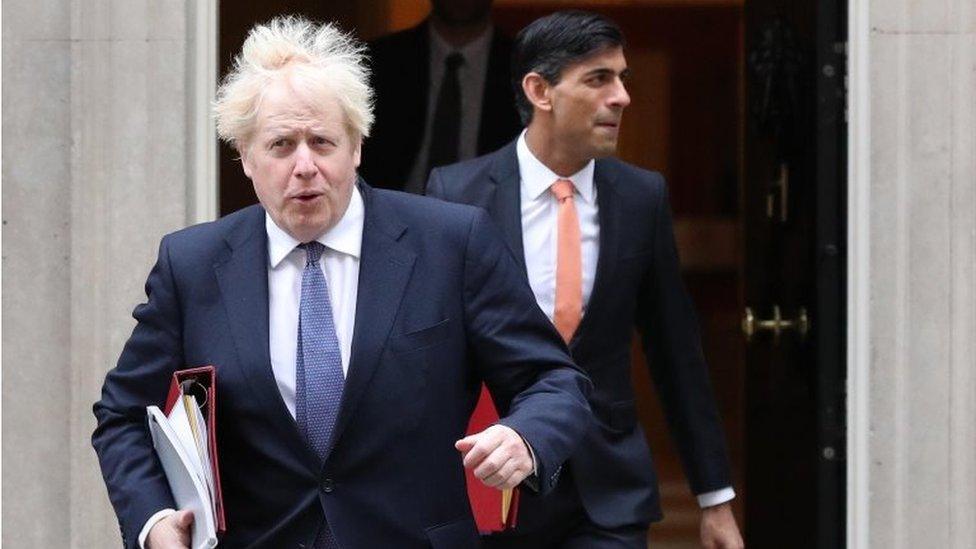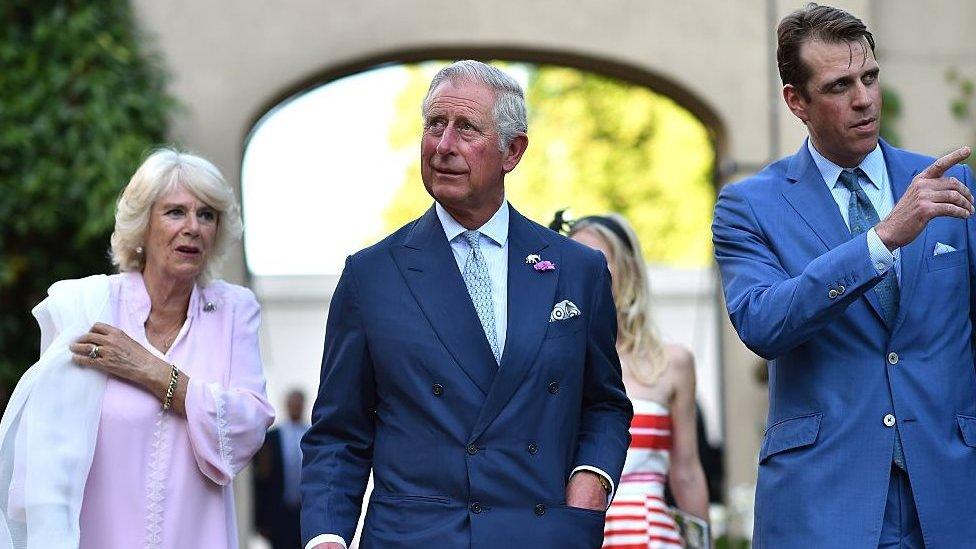Conservative donors have no influence on policy, insists Grant Shapps
- Published

Tory donors are not "immoral" and have no influence on government policy, minister Grant Shapps has insisted, amid cash-for-access questions.
Last week, the Financial Times reported, external those who donated £250,000 could get access to the PM and chancellor.
Mr Shapps - a former Tory chairman - said the party adhered "very carefully" to the rules on donations.
Labour are urging the Tories to name the donors and ministers involved in an elite club set up by the party.
The "advisory board" was developed by Conservative Party co-chair Ben Elliot, who connected major Conservative supporters with ministers - including Boris Johnson and Rishi Sunak.
Conservative donor and businessman Mohamed Amersi told the newspaper it was a "very elite" club with people required to "cough up £250,000 per annum or be a friend of Ben" in order to join.
The advisory board gets together occasionally to receive political updates, Tory sources say, and has occasionally met the prime minister and chancellor. It was created under Theresa May's leadership.


If you want to join one of the Tory Party's elite donor clubs don't bother checking their website.
There's no mention of the advisory board - its existence was recently revealed by the FT.
There's no mention of the leader's group either, which previously required a minimum donation of £50,000 a year to join.
Under David Cameron the Conservatives published some details about which donors attended private dinners with the leader but that practice seems to have stopped.
Questions to Conservative Party HQ about how much donors have to pay to join the advisory board, who's on it and when it meets remain unanswered.
Raising money to fund political parties is entirely legitimate and necessary - the names of donors and the sums given are published by the Electoral Commission.
But this is an issue of transparency and access - and the Conservative Party is proving very reluctant to pull back the curtain.

Asked about the group on the BBC's Today programme, Mr Shapps, now the transport secretary, said there were "a lot of people in this country who believe in this country" and that there was "nothing inherently bad or wrong" about joining a political party.
"It doesn't change any policies but you're certainly welcome to hear about the policies," he added.
Labour leader Sir Keir Starmer said the existence of the club was "the latest example of one rule for them and one rule for everybody else".

The exclusive club was developed by Conservative co-chair Ben Elliot (right) seen here with his aunt the Duchess of Cornwall and Prince Charles
He urged the Conservatives to "tell us who has been involved with this, who has been meeting who and how much money has exchanged hands".
"We can't have this sleaze, this murky cash-for-access," he added.
Asked if he would scrap Labour's own Rose Network Chair Circle, external, Sir Keir said there was nothing "wrong" with party donations but that "the issue is cash for access" and "concerning levels of influence".
Members of the £5,000-per-year network get access to invite-only events, including a reception with the party's deputy leader Angela Rayner.
Responding to Labour criticism, earlier in the week, Conservative co-chair Amanda Milling said all parties had to raise money in order to pay their staff and campaign in elections and that Labour also sought contributions from wealthy donors.
"If political parties didn't have a fundraising system in place they would be forced to use taxpayers money - this would mean less money for frontline services like schools, police and hospitals," she said.
How much do the parties get in donations?
Between 2010 and 2020, Labour raised £152m in donations - the majority of which came from trade unions - compared with the £267m collected by the Conservatives.
The Conservatives received a sizeable chunk from companies, whose gifts made up 29% of their donations.
In the final three months of 2019 - when the last general election was held - the Conservatives raised more than £37.6m, while the Liberal Democrats collected £13.3m.
During the same period, Labour raised £9.8m and the Brexit Party came fourth with £7.1m.
Labour said two thirds of the donations it received during the 2019 election were under £20.